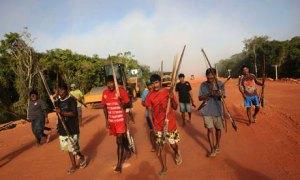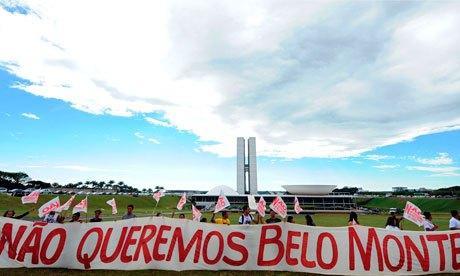
Brazil dam row – local activists march past machinery being used in the construction of the massive Belo Monte hydroelectric dam. Photograph: Reuters
Cross posted from The Guardian
An Amazonian community has threatened to “go to war” with the Brazilian government after a military incursion into their land by dam builders.
The Munduruku indigenous community in Para state say they have been betrayed by the authorities, who are pushing ahead with plans to build a cascade of hydropower plants on the Tapajós river without their permission.
Public prosecutors, human rights groups, environmental organisations and Christian missionaries have condemned the government’s strong-arm tactics.
Helicopters, soldiers and armed police have been involved in Operation Tapajós, which aims to conduct an environmental impact assessment for the first proposed construction, the 6,133MW São Luiz do Tapajós dam.
The facility, to be built by the Norte Energia consortium, is the biggest of three planned dams on the Tapajós, the fifth-largest river in the Amazon basin. The government’s 10-year plan includes the construction of four larger hydroelectric plants on its tributary, the Jamanxim.

“The Munduruku have already stated on several occasions that they do not support studies for hydroelectric plants on their land unless there is full prior consultation,” the prosecutors noted in a statement.
A similar survey in November led to deadly conflict. One resident, Adenilson Kirixi, was killed and several others were wounded in clashes between local people and troops accompanying the researchers in Teles Pires village.
The ministry of mines and energy noted on its website that 80 researchers, including biologists and foresters, would undertake a study of flora and fauna. The army escort was made possible by President Dilma Rousseff, who decreed this year that military personnel could be used for survey operations.
Missionaries said the recent show of force in Sawré Maybu village, Itaituba, was intimidating, degrading and an unacceptable violation of the rights of the residents.
“In this operation, the federal government has been threatening the lives of the people,” the Indigenous Missionary Council said. “It is unacceptable and illegitimate for the government to impose dialogue at the tip of a bayonet.”
The group said Munduruku leaders ended a phone call with representatives of the president with a declaration of war. They have also issued open letters calling for an end to the military operation, “We are not bandits. We feel betrayed, humiliated and disrespected by all this,” a letter states.
One of the community’s leaders, Valdenir Munduruku, has warned thatlocals will take action if the government does not withdraw its taskforce by 10 April. He has called for support from other indigenous groups, such as the Xingu, facing similar threats from hydroelectric dams.
Environmental groups have expressed concern. The 1,200-mile waterway is home to more than 300 fish species and provides sustenance to some of the most biodiverse forest habitats on Earth. Ten indigenous groups inhabit the basin, along with several tribes in voluntary isolation.
With similar conflicts over other proposed dams in the Amazon, such as those at Belo Monte, Teles Pires, Santo Antônio and Jirau, some compare the use of force to the last great expansion of hydropower during the military dictatorship.
“The Brazilian government is making political decisions about the dams before the environmental impact assessment is done,” said Brent Millikan of the International Rivers environmental group.
“The recent military operations illustrate that the federal government is willing to disregard existing legal instruments intended to foster dialogue between government and civil society.”

